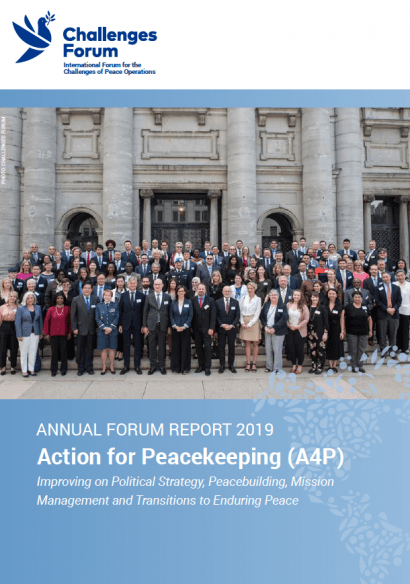2019 Recommendations

The 2019 Challenges Annual Forum was hosted 10 – 11 June in Montreal by the Government of Canada, and gathered more than 120 participants. The theme was A4P:Improving on Political Strategy, Peacebuilding, Mission Management and Transitions to Enduring Peace.
These key recommendations offer a summary of the discussions that took place as part of the Annual Forum.
To read the full Annual Forum report 2019, click here.
- Consider more innovative approaches to roles and responsibilities in drafting the mandates of peace operations (e.g. opening up pen-holder roles, inclusion of civil society and marginalized groups).
Stakeholder action: Security Council. - Map how different mission leadership teams have shared responsibilities, to identify how to strengthen the role and ability of the SRSG to focus more on political strategy. Stakeholder action: Secretariat, Field Missions
- Consider mandating processes that evolve based on conditions on the ground, rather than a set timetable. Stakeholder action: Security Council
- Improve strategic communication by sharing mission objectives, achievements and milestones with internal and external stakeholders, as a mechanism to build trust and generate support for resources. Stakeholder action: Field Mission, Secretariat
- Undertake more comprehensive analysis on the contribution and impact of women in peace operations on the basis of gender disaggregated data.
Stakeholder action: Member States, Think Tanks, Secretariat
- Examine whether existing selection criteria allows for an assessment of a candidate’s willingness to be mentored and trained.
Stakeholder action: Secretariat, Member States
- Identify opportunities to support and develop the leadership soft skills in the management team within missions, to strenghten their performance and ability to respond in a crisis.
Stakeholder action: Secretariat, Field Missions
- Ensure mission leaders, in partnership with national actors, use ‘theories of change’ or change management strategies, based on salient drivers of peace and conflict, to support peacebuilding during mission planning and implementation.
Stakeholder action: Secretariat, Member States, Field Missions
- Include contingencies for ‘unplanned’ transitions as part of planning scenarios for the mission.
Stakeholder action: Secretariat, Field Missions
- Ensure early mission planning processes clearly map the different stakeholders, with analysis of how they are perceived by the local community (e.g. government, armed groups, regional actors etc.) and their motivations, in order to identify key stakeholders to prioritize engagement with in the development and implementation of a political strategy.
Stakeholder action: Field Missions
- Ensure there is dedicated resource in the mission (eg: In the Strategic Planning Unit) with transition and change management experience.
Stakeholder action: Secretariat, Field Missions, Member states
- Develop baselines for the effective transition of a peace operation, which identify the opportunities and risks at different stages of the mission lifecycle.
Stakeholder action: Secretariat, Field Missions, Think tanks
- Analyze and identify the comparative advantages and limits of UN peace operations, mapping the skills and resources that partners such as regional organizations can provide.
Stakeholder action: Security Council, Secretariat, Think Tanks
- ‘Twinning’ T/PCCs with different capabilities to provide support on performance issues and contingent owned equipment.
Stakeholder action: Secretariat, Member states
- Undertake a stock-take in 2020 to assess level of progress and impact in the field as part of A4P implementation.
Stakeholder action: Secretariat, Member States, Civil Society

